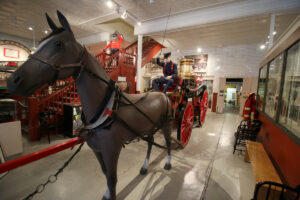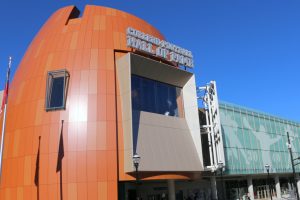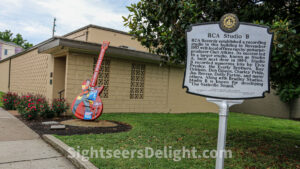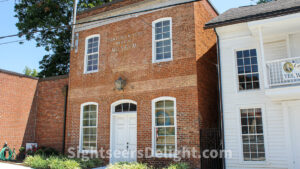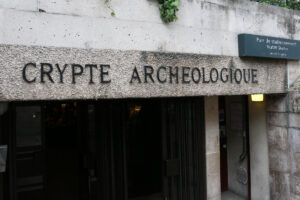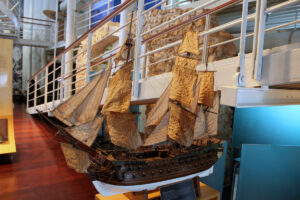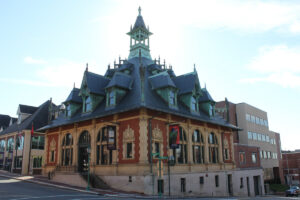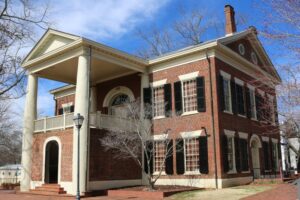The Central Ohio Fire Museum & Learning Center opened in 2002 inside the restored historic Columbus Engine House (No.16) dating to 1908. In addition to historic engines and equipment, the museum aims to educate visitors about the dangers of fire and features a Safety Kitchen and a Safety Bedroom showing potential hazards and how to escape in an emergency.
43215
Christchurch Art Gallery Te Puna o Waiwhetu opened in May 2003 and replaced the former Robert McDougall Art Gallery, which opened in 1932. The Christchurch Art Gallery is home to works by both New Zealand and international artists. Following the 2010 Canterbury earthquake and the February 2011 Christchurch earthquake, Civil Defence used the building as a headquarters. The art gallery reopened in December 2015 following extensive refurbishments.
To run the government and military during World War II, Prime Minister Winston Churchill needed a place safe from German bombing raids. He found that place in a sprawling underground complex today known as the Churchill War Rooms. The complex was operational starting Aug. 27, 1939, a week before Great Britain declared war on Germany. The museum complex offers an incredible, one-of-a-kind look at Winston Churchill and England’s approach to World War II. The complex is home to meeting rooms, bedrooms and map rooms, where the war’s progress was plotted and monitored.
The College Football Hall of Fame opened in Atlanta in August 2014 in Downtown Atlanta next to the Georgia World Congress Center and Centennial Olympic Park. The College Football Hall of Fame was previously located in South Bend, Ind. More than 975 players and more than 210 coaches have been enshrined in the College Football Hall of Fame. More than 300 schools are represented. The 94,256-square-foot facility includes exhibits, interactive displays, event space and a 45-yard indoor football field.
30313
The Country Music Hall of Fame first museum opened on Music Row in 1967. The current museum — located in downtown Nashville — opened in a $37 million facility in 2001 and features various permanent and temporary exhibits dedicated to telling the history of country music, from its earliest roots to modern-day superstars. No visit to the museum would be complete without purchasing an add-on tour of RCA Studio B. Located a few blocks away from the museum, the historic studio — still in use today — has been used by some of music’s biggest stars, from The Everly Brothers to Roy Orbison to Elvis Presley.
37203
On March 30, 1842, Crawford W. Long stepped into the history books when he used Ether as a surgical anesthesia. His legacy lives on at the museum that bears his name. The Crawford W. Long Museum in the Jackson County city of Jefferson, about 25 miles from Athens, opened in 1957. It reopened in January 2010 following an 18-month renovation.
30549
The Archaeological Crypt located in front of Notre Dame preserves 2,000 years of Parian history. The crypt is home to Roman ruins dating to antiquity, which were discovered during the late 1960s and early 1970s. The museum was created in 1980.
In a picturesque mansion located on the Waaigat inlet and dating to 1729, the Maritime Museum features an incredible collection of artifacts and stories about the island’s inextricable connection to the sea. Curacao was “discovered” in 1499 and has been an important shipping center throughout its history.
In 1898, the federal government built a customs house and a post office at the corner of Second and Commerce streets to help process the increasing volumes of mail to and from the city. In 1984, the building was transformed into the Customs House Museum and Cultural Center touted as the state’s second-largest general interest museum. The museum features a number of permanent exhibits, including the postmaster’s office and Memory Lane, dedicated to telling the story of Clarksville and Montgomery County’s history.
37040
The 1836 Lumpkin County Courthouse in downtown Dahlonega, Ga., is home to the Dahlonega Gold Museum Historic Site. Located on the town square, the courthouse is the oldest surviving courthouse building in the state, serving in that capacity until 1965. The state park is a testament to the first major gold rush in the nation. The museum collection includes exhibits about how gold is mined, tools miners used and actual samples of gold. The building features wooden seats from 1889 and the judge’s chambers.
30533

